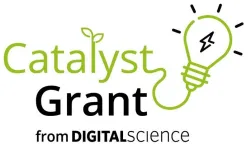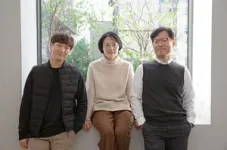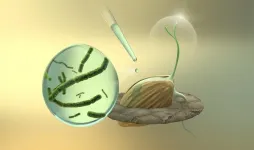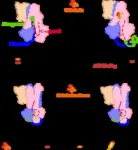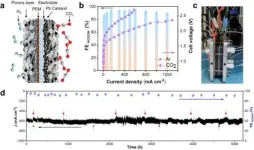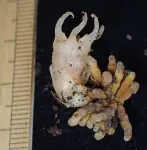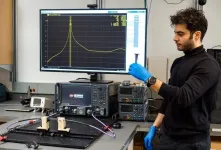(Press-News.org) Digital Science has awarded two new Catalyst Grants of £25,000 each to innovative AI-based technology ideas aimed at advancing global research.
The winners will use the funding to develop their ideas, which include using AI to alleviate the burden on researchers of applying for research funding, and to predict research impact.
The winning applications from Digital Science’s 2023 Catalyst Grant round announced today are:
Atom – Tomer du Sautoy (co-founder and CEO) and Hamilton Evans (co-founder and CTO)
Future Metric – Dr Amy Nelson (CEO) and Dr Mohamad Zeina (CTO)
Atom – US-based (South Pasadena, California)
Scientists Tomer du Sautoy and Hamilton Evans argue the current system of funding research is stifling scientific discovery, with the world’s leading researchers spending up to 50% of their time on grant applications instead of on science. They aim to build an “end-to-end system” using neural matching, Generative AI and automated workflows “to help researchers find, write and manage grants, reducing the time they spend on grant applications by up to 95%”.
Future Metric – UK-based (London)
Medical doctors Dr Amy Nelson and Dr Mohamad Zeina are senior research associates at UCL’s Queen Square Institute of Neurology. They seek to develop novel metrics of research impact, using predictive AI modelling to help better understand research impact ahead of time, so that researchers can adjust their work and improve their outcomes for society.
Digital Science CEO Dr Daniel Hook says: “I congratulate the newest winners of Digital Science’s Catalyst Grants. Each of the winners has demonstrated a novel and engaging approach to problems that have the potential to be addressed by AI. The responsible use of AI is critical in safeguarding research broadly and each of these projects will take care to act in the best interests of the research community. We will not only watch with keen interest but also actively help and support them to grow their ideas in the service of a healthy AI-enabled research ecosystem.”
Tomer du Sautoy says: “Winning the Catalyst Grant means a great deal to us, mostly as an opportunity to join the Digital Science ecosystem. Digital Science is a powerhouse when it comes to research software and there’s great synergy between what we’re building and the rest of the Digital Science community.
“The funds will enable us to expand our AI capabilities over the coming months – we’ve got a huge list of features to be released. Ultimately, our goal is to boost the scientific economy, with Atom becoming the underlying infrastructure to support the distribution of research funding.”
Dr Amy Nelson says: “Just as we’re keen to use AI to solve complex medical problems, we also believe it has a role to play in helping to better understand the impact of research and how to make the most of research’s potential – such as, which research papers are more likely to lead to new policy, or a new drug.
“We’re excited to be awarded the Digital Science Catalyst Grant, as it means we can take our research project and convert it into a real tool or application that can be used by researchers and their institutions, helping to improve the impact of their research and creating benefits for society.”
Steve Scott, Director of Portfolio Development at Digital Science, says: “With our 2023 Catalyst Grant round, we set out to find the most innovative uses of generative AI to support research – and we received the largest number of submissions in the history of Catalyst Grant. It gives us great pleasure to choose two outstanding ideas from among the research community, and to invest back into that community.”
See the video announcement about the new Digital Science Catalyst Grant winners: https://youtu.be/i5kR51g41mY
About Catalyst Grant
Digital Science’s Catalyst Grant is an international initiative supporting innovation in new software tools and technologies, to advance research and create meaningful change.
The program supports and invests in early-stage ideas in the novel use of technology, with an award of up to £25,000 for the most promising ideas that aid research and further its impact on society.
Winning individuals or startups do not need a complete business or development plan. Over the past 13 years Digital Science has invested over £250,000 into several innovative startups through Catalyst Grants, many of which have gone on to become important products and solutions within Digital Science itself.
About Digital Science
Digital Science is an AI-focused technology company providing innovative solutions to complex challenges faced by researchers, universities, funders, industry and publishers. We work in partnership to advance global research for the benefit of society. Through our brands – Altmetric, Dimensions, Figshare, ReadCube, Symplectic, IFI CLAIMS Patent Services, Overleaf, Writefull, OntoChem, Scismic and metaphacts – we believe when we solve problems together, we drive progress for all. Visit www.digital-science.com and follow @digitalsci on Twitter/X or on LinkedIn.
Media contacts
David Ellis, Press, PR & Social Manager, Digital Science: Mobile +61 447 783 023, d.ellis@digital-science.com
END
Digital Science announces Catalyst Grant winners, supporting AI-based innovations to benefit research
2024-02-29
ELSE PRESS RELEASES FROM THIS DATE:
Targeting seed microbes to improve seed resilience
2024-02-29
Fonio (Digitaria exilis), a type of millet, is the oldest indigenous crop in West Africa and one of the fastest maturing cereals. Despite its low yield, the combination of quick maturation and drought tolerance and its ability to thrive in poor soils make it a useful model for understanding how cereals can adapt to future climate change conditions.
Nutritionally, fonio is comparable to other millets, says KAUST researcher Naheed Tabassum, but yields are much lower than the major cereal crops rice, maize and wheat. Tabassum believes fonio could complement staple crops amid climate change and desertification ...
Astronomers discover heavy elements after bright gamma-ray burst from neutron star merger
2024-02-29
An international team of astronomers — including Clemson University astrophysicist Dieter Hartmann — obtained observational evidence for the creation of rare heavy elements in the aftermath of a cataclysmic explosion triggered by the merger of two neutron stars.
The massive explosion unleashed a gamma-ray burst, GRB230307A, the second brightest in 50 years of observations and about 1,000 times brighter than a typical gamma-ray burst. GRB230307A was first detected by NASA’s Fermi Gamma-Ray Space Telescope on March 7, 2023.
Using multiple space- and ground-based ...
USTC reveals molecular mechanism of transmembrane bilirubin transport by human ABCC2 transporter
2024-02-29
The metabolic process of bilirubin has been a focus in medical research since the abnormal accumulation of bilirubin has been found to be associated with a variety of diseases. Bilirubin is a substance produced by the breakdown of aging or damaged red blood cells, and its effective removal is essential for human health.
A research team led by Prof. CHEN Yuxing and Prof. ZHOU Congzhao from the University of Science and Technology of China (USTC) of the Chinese Academy of Sciences has revealed the three-dimensional structure and working mechanism of the human bilirubin transporter ABCC2. The study was published ...
USTC realizes durable CO2 conversion in proton-exchange membrane system
2024-02-29
The metabolic process of bilirubin has been a focus in medical research since the abnormal accumulation of bilirubin has been found to be associated with a variety of diseases. Bilirubin is a substance produced by the breakdown of aging or damaged red blood cells, and its effective removal is essential for human health.
A research team led by Prof. CHEN Yuxing and Prof. ZHOU Congzhao from the University of Science and Technology of China (USTC) of the Chinese Academy of Sciences has revealed ...
A new plant’s name that tells a story
2024-02-29
A new species and genus of fairy lantern, tiny glass-like white plants that feed on fungi, has been discovered in Japan. In the country renowned for its extensive flora research, the discovery of a new plant genus is extremely rare and has not occurred in almost 100 years.
Fairy lanterns, or Thismiaceae as they are known to botany, are very unusual plants found mainly in tropical but also in subtropical and temperate regions. First of all, they are not green and do not engage in photosynthesis, but rather feed on fungal mycelia in the ground. As a consequence, they are often hidden under fallen leaves and only for a brief period produce above-ground flowers that look like glasswork. The ...
Noteworthy studies to be presented at the 2024 Multidisciplinary Head & Neck Cancers Symposium
2024-02-29
PHOENIX, February 29, 2024 — Research on patient-centered treatment of head and neck cancers will be presented at the 2024 Multidisciplinary Head and Neck Cancers Symposium, which takes place in Phoenix and online today through March 2. Media registration is available via our press kit, and general registration is available via the meeting website.
Seven high-impact studies recommended by symposium leadership for media are noted below. All abstracts are available online. Experts are available to provide outside commentary and perspective on research at the meeting; ...
Turbocharging CRISPR to understand how the immune system fights cancer
2024-02-29
Over the past two decades, the immune system has attracted increasing attention for its role in fighting cancer. As researchers have learned more and more about the cancer-immune system interplay, several antitumor immunotherapies have become FDA-approved and are now regularly used to treat multiple cancer types.
Yet despite these advances, much remains unknown about how the immune system fights cancer — and about immunity in general, said Martin LaFleur, a postdoctoral fellow in the laboratory of Arlene ...
UBC Okanagan researchers create new compound to build space-age antennas
2024-02-29
In a first-of-its-kind development, UBC Okanagan researchers, in collaboration with Drexel University, have created a new compound that can be used to 3D print telecommunication antennas and other connectivity devices.
These 3D printed products, created by combining a two-dimensional compound called MXenes with a polymer, can be used as an alternative for metallic counterparts and can make a vast improvement in communication technology including elements such as antennas, waveguides and filters.
Waveguides are everywhere, yet most people don’t know what they are, says Dr. Mohammad Zarifi, a researcher in UBC Okanagan’s Microelectronics and Gigahertz ...
Study detects cognitive changes in older drivers using in-vehicle sensors
2024-02-29
An estimated 4 to 8 million older adults with mild cognitive impairment are currently driving in the United States, and one-third of them will develop dementia within five years. Individuals with progressive dementias are eventually unable to drive safely, yet many remain unaware of their cognitive decline.
Currently, screening and evaluation services for driving can only test a small number of individuals with cognitive concerns, missing many who need to know if they require treatment.
Nursing, engineering and neuropsychology researchers at Florida Atlantic University are testing and evaluating a readily and rapidly available, unobtrusive in-vehicle sensing ...
Terasaki Institute for Biomedical Innovation announces 2024 Paul Terasaki Award recipient
2024-02-29
(LOS ANGELES) – February 29, 2024 - The Terasaki Institute for Biomedical Innovation (TIBI) is pleased to announce their selection of Professor Nicholas A. Peppas of The University of Texas at Austin as the recipient of the 2024 Paul Terasaki Distinguished Scientist Innovation Award. The award will be presented at TIBI’s 2nd annual Terasaki Innovation Summit, to be held March 27-29, 2024, at the UCLA Meyer & Renee Luskin Conference Center.
The award was created in memory of Dr. Paul I. Terasaki, a pioneer in organ transplant research and innovation. It recognizes outstanding achievement in the field of biomedical ...
